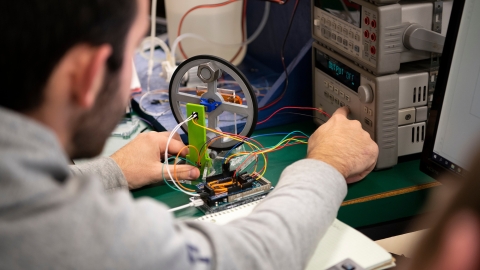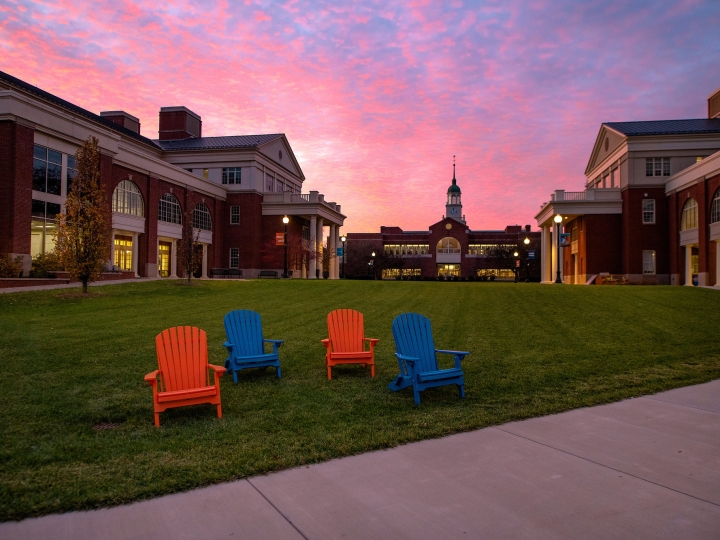
Tips for Choosing an Engineering College
June 1, 2020
Photo by Emily Paine, Communications
If you're thinking about majoring in engineering in college, you have a lot of choices ahead of you. Engineering is one of the most popular majors in the U.S. — it's chosen by about one in 20 students and offered at more than 1,000 schools across the country.
Those schools come in many different shapes and sizes, from huge state universities with comparably large engineering colleges, to small liberal arts schools that teach engineering alongside other disciplines, to standalone engineering and polytechnic institutes.
Each school has its own strengths and weaknesses, and there’s no single type that qualifies as one of the best engineering schools for every student. That's because choosing an engineering college is really about finding what's best for you.
The best way to choose an engineering college is to start broad, then narrow your search based on what you're looking for. That might mean exploring top engineering schools in the United States with large campuses and thousands of students, or smaller institutions like Bucknell where faculty relationships and hands-on opportunities start from your first year. Poke around their websites, look at photos and try to visit a few different types of campuses to see what feels right for you. Below, you'll find some suggestions for what to look for and questions to think about as you narrow down your search.
If you end up putting Bucknell on your list, we encourage you to explore more than just our engineering programs. Because while we have some of the top-ranked undergraduate engineering programs in the U.S., there's much more to your four years here than just classes and labs. Get started by checking our Meet Bucknell and College of Engineering pages.
Choosing an Engineering Major
Engineering is a broad field — at its core, it's about using scientific and mathematical principles to design and make things. To help choose your engineering major, think about what you're most interested in designing and making, as well as the classes you most enjoy in high school.
A word of caution, though: Keep an open mind. If you want to work in tech, computer science might seem like the obvious path, but a degree in computer engineering or electrical engineering might apply too. If you want to design systems that keep water clean and protect the environment, environmental engineering might seem like the most appropriate choice, but civil and chemical engineering are just as relevant. Want to design cars or airplanes? Automotive or aerospace engineering seem like obvious picks, but mechanical engineering will give you many of the skills you need, and electrical and computer engineering are relevant too, given how much technology can be found in modern vehicles. Don't just focus on the industry you want to work in; think about what you want to get up and do every day.
And if you're not sure? Look for a school with a broad number of engineering majors, and make sure the school will give you some time to decide between them. There's no better way to discover what you're most interested in than by trying it out for yourself.
At Bucknell, we offer eight different engineering majors, giving you a wide variety of options, especially for a smaller engineering college (we have around 700 engineering students). You can choose:
- Biomedical engineering
- Chemical engineering
- Civil engineering
- Computer engineering
- Computer science & engineering
- Electrical engineering
- Environmental engineering
- Mechanical engineering
We also offer a standalone degree in computer science taught by College of Engineering faculty, although your degree will come from Bucknell's College of Arts & Sciences. If you're interested in leadership or starting your own company, we also offer a five-year program in engineering & management.
If you aren't sure which track to choose, you can apply as an undecided engineering major and take some time to figure it out. In fact, your first Bucknell engineering class, Engineering 100, will introduce you to all of our engineering majors and the different faculty who teach them, allowing you to explore which path is most appealing to you.
Are There Weed-out Classes?
Engineering majors are popular. Colleges know this, and some will admit way more engineering students than they can graduate, packing them into 200-person lecture halls for difficult first-year courses, knowing that many of those students will transfer to other majors that aren't as popular. There's a name for these courses; they’re called "weed-out classes."
Spend some time thinking about whether you're comfortable with this approach. What's the largest class you've taken in high school? Were you comfortable learning in a class that size, or do you prefer a more personal approach? Do you think forcing students to compete for a shot at an engineering degree is an approach that has merit, or does it make you uncomfortable to think a college would treat its students that way?
At Bucknell, we don't believe in weed-out classes. When we admit you to the College of Engineering, we do it because we believe you have the ability to succeed, and we'll support you through all four years of your education. It's one reason why we call our students engineers from their first year on campus.
In your first engineering course at Bucknell, Engineering 100, you won't be in a lecture hall with 200 students; you'll be in a classroom with less than 20, and you'll get to know professors from across the college as they introduce you to all eight engineering majors we offer here. Throughout your undergraduate experience, you'll also find support through peer and faculty mentoring, tutoring and organized study groups for important math, science and engineering courses. You also have opportunities to work one on one with your professors as you pursue research breakthroughs and create new technologies together — something you won't get to do until grad school at many other colleges.
Labs and Learning Spaces: When Do You Get to Use That Cool Equipment?
When you go on college tours and they show you their latest state-of-the-art research facilities and technologies, be sure to ask, "When do I get to use that?"
You're probably interested in engineering because you want to do something, whether that's writing your own computer programs and apps, concocting new chemical compounds or designing structures and machinery. But at some schools you may find that the coolest, most powerful resources for doing all that are reserved just for faculty, grad students or research assistants.
That's something to keep in mind when you look at rankings. U.S. News & World Report, for instance, divides its rankings into schools that offer a Ph.D. versus schools that don't. For colleges that have grad schools, much of their ranking depends on how many big research grants their faculty bring in and how many papers they publish — but that doesn't necessarily translate to a better undergraduate experience. Their faculty have grad students and postdoctoral fellows to help them with that work.
Bucknell's engineering professors do research and get published in top journals, too, but we're an undergraduate-focused school that doesn't offer doctorates. Here, you'll find undergraduate students working in all of our labs and pursuing technology breakthroughs alongside their professors, some from their very first year on campus. Like Graham Heckert ’23. Graham came to Bucknell knowing he was interested in electric cars, and since his first year on campus has been working alongside mechanical engineering professor Craig Beal on a real, prototype electric car equipped with experimental next-generation self-driving technologies. You'll only find opportunities like that at an undergraduate-focused institution.
Minors, Liberal Arts, Study Abroad: What Else Do You Want to Do?
There's a lot to learn to become an engineer. Wherever you study engineering in college, you're going to need to take a lot of math and science classes in addition to a structured sequence of engineering courses. That means you won't have as much space in your schedule to explore other topics that interest you as you might if you chose another major. Do you play an instrument and want to study music? Are you interested in minoring in another subject? Do you want to start a business and learn about management? What about studying abroad?
If those or other experiences appeal to you, make sure to investigate whether you can pursue them at the engineering schools on your list. At some schools, it may be impossible to study abroad and still graduate in four years, for example. Or you might only have room for one or two elective courses during your entire time in college.
At Bucknell, we believe that exploring different experiences will make you a more well-rounded thinker who can better use your engineering skills to make a difference in the world. That's why we leave room for you to take classes outside your major from any of Bucknell's three colleges, and even add a minor from the College of Arts & Sciences or the Freeman College of Management (more than 70 in all). We also offer five-year programs in engineering & liberal arts and engineering & management if you know from the start you want to pursue a second major alongside engineering.
And all of our engineering students have the opportunity to study abroad, whether it's through one of our "Bucknell In" study-abroad programs or Engineering 290 — a three-week exploration of engineering in a global and societal context that takes place in a different country each year. Designed just for engineering majors, this course has transported Bucknell students to countries on six different continents, including Iceland, Ghana and Brazil.
Outcomes: What Comes Next?
Whatever school they choose, engineering majors enjoy some of the best job-placement rates and starting salaries of any major. Bucknell is no different in that regard — we typically see nearly 100% of our students find jobs or get into grad school, with a starting salary around $70,000 a year. (You can see our outcomes data here.) By choosing and sticking with engineering, you've made a wise choice for your future career prospects.
What will set you apart as an engineering graduate are the real-world experiences you have as a student — both inside and outside the classroom. As you explore schools, look at how they offer their students those real-world experiences by partnering with companies, nonprofits and government entities.
Some schools offer co-op programs, where you alternate between time spent in the classroom and time spent working as a full-time, paid employee or intern for a company. This is a great way to earn real, on-the-job experience that can often lead directly to a first job after graduation. But it can also be a little limiting, especially if you want to try out different applications for your engineering degree. You'll only be working with a single company, and doing basic, entry-level work.
At Bucknell, we offer a similar, but more open-ended experience through our senior design program, which partners teams of students with real companies and organizations to solve a real problem with real engineering solutions. We also offer similar experiences earlier on through classes and our partnership with Bucknell's Small Business Development Center. These experiences are less structured than a co-op, but they can also be more transformative and transferrable because you're in the driver's seat of the experience. And you can take that experience to any position you choose to take on.
Next Steps
In the end, you can rest assured that you've made a smart choice for your future by choosing to major in engineering — wherever you decide to go for your next four years. Deciding where you'll study engineering should involve thinking about yourself as much exploring different schools. If you want to learn more about Bucknell, start here.

